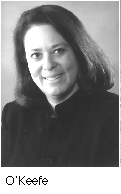The University Record, July 8, 1998
Media Union ‘has incredibly rich resources,’ says new head
By Jane R. Elgass
 Barbara O’Keefe of the University of Illinois at Urbana-Champaign (UIUC) will be named director of the Media Union and professor of information, effective Sept. 1.
Barbara O’Keefe of the University of Illinois at Urbana-Champaign (UIUC) will be named director of the Media Union and professor of information, effective Sept. 1.
At Illinois, O’Keefe holds appointments as professor in the departments of Speech Communication and Mechanical and Industrial Engineering, as senior research scientist in the National Center for Supercomputing Applications and as director of the Advanced Information Technology Laboratory at the UIUC Library. Her research specialty is scientific collaborations, with a focus on engineering design teams.
In announcing O’Keefe’s appointment, Provost Nancy Cantor said, “Dr. O’Keefe will bring the expertise and vision needed to integrate the resources of the Media Union into the academic life of our faculty and students.
“One of the goals of the Media Union,” Cantor noted, “is to create a community without walls by providing the tools and space for collaborative work among faculty and students across disciplines.”
The technologically advanced 225,000-square-foot facility on the University’s North Campus houses state-of-the-art equipment that enables faculty and students to create and explore all forms of artistic expression and scientific knowledge in both the physical and simulated worlds and access collections of information resources traditionally found in a library.
O’Keefe says the Media Union is the “most exciting thing I’ve seen in a long time. It has incredibly rich resources.”
Visiting the facility a year ago, O’Keefe was struck by how well the building “worked to support student collaborations. Three or four students were clustered around work stations. The whole space supported them. The building and the way people were using it sold me.”
One of O’Keefe’s first tasks will be to make the Media Union, now operating with a skeleton staff, fully operational. Once that is accomplished, she will focus on two programmatic initiatives.
“It’s very important that the Media Union become a spark for technological innovation all across campus,” she says. “To make that happen, we need to create a virtual Media Union–a repository of online resources.”
A faculty member, for example, might create an online workbook for students that presents problems and then automatically grades the assignments.
Or, a faculty member might want to create a hyperlinked library of material for student exploration and study.
“Faculty need to be able to integrate new resources into their teaching and research,” O’Keefe says. “They should be able to easily see the newest and latest innovations.”
O’Keefe also wants to “make the Media Union come alive as an incubator for research and development by building on the tremendous reservoirs of talent and capability we already have.” She plans to spend a great deal of time with faculty who want to work in the Media Union to determine their needs and develop collaborative initiatives that would attract funding.
O’Keefe says she wants the facility to do three things:
• Effectively support everyday teaching and research activities in ways that make it easy for faculty to find and apply new technologies.
• Become a research incubator “that attracts the best minds, inspiring them and helping them find appropriate collaborators to produce new solutions to problems of communication and information management.”
She notes that these activities will require industry partnerships with incubator activities to enable real-world testing of solutions, “because then they can have an impact on people’s lives.”
• Be a spokesperson for campus and a showcase for faculty and student activities in technological exploration and innovation, and to have a presence in national policy debates.
“We need to not only support and incubate work, but also be a voice for the campus in the whole arena of new technology development and evaluation,” O’Keefe says.
She also is looking forward to her faculty appointment in the School of Information, which she says has “an outstanding group of faculty in the study of information systems and cooperative work.”
O’Keefe holds a Ph.D. in speech communication from UIUC and was assistant professor in the Department of Speech Communication, Theatre and Journalism at Wayne State University beginning in 1976. In 1979 she accepted an appointment at Pennsylvania State University, returning to UIUC in 1980.
She has published extensively and served as a referee for Communication Monographs; Human Communication Research; Argumentation and Advocacy; Communication Research; Communication Studies; Language and Social Psychology; IEEE Transactions on Systems, Man and Cybernetics; and other journals.
O’Keefe’s current research is focused on understanding collaboration in scientific and technical work, especially the role of technology in collaborative work. She is part of a multidisciplinary team that is designing, implementing and evaluating software to support engineering design. Her work has been funded by the National Science Foundation, the Department of Defense and the Sloan Foundation.
O’Keefe has taught courses in discourse analysis, analysis of interpersonal interaction processes, written communication, communication technology and computer-supported cooperative work.
She has received the UIUC School of Humanities Teaching Excellence Award, as well as awards from the UIUC Summer Instructional Awards Program and the UIUC Technologies Board.

